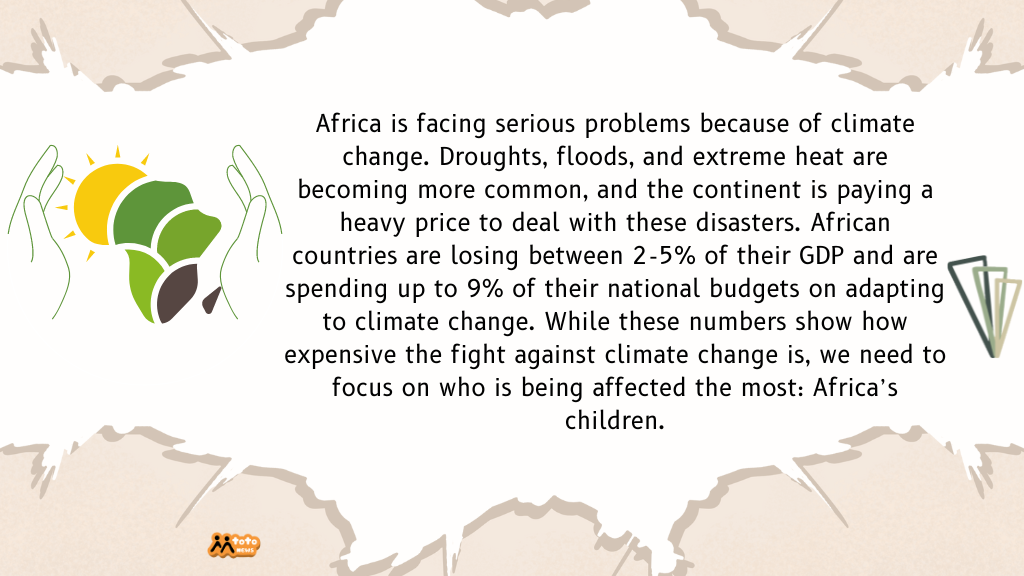
Africa is facing serious problems because of climate change. Droughts, floods, and extreme heat are becoming more common, and the continent is paying a heavy price to deal with these disasters. African countries are losing between 2-5% of their GDP and are spending up to 9% of their national budgets on adapting to climate change.
While these numbers show how expensive the fight against climate change is we need to focus on who is being affected the most, Africa’s children.
Children are Suffering the Most
When disasters like floods or droughts strike, children are the ones who suffer the most. They lose their homes, can’t go to school, and often don’t get enough food. By 2030, up to 118 million extremely poor people in Africa could be at risk from climate disasters. For many of these families, it will become harder to escape poverty, and this will have the biggest impact on children.
When crops fail because of drought or communities are flooded, parents struggle to provide basic needs like food, water and shelter. Children in turn, go hungry, fall sick, and miss out on their education.
Education Disrupted by Climate Disasters
Climate change is also disrupting children’s education. Floods wash away schools, and droughts force families to leave their homes in search of food and water, stopping children from going to school. Girls are especially at risk. When families face hard times, they often pull their daughters out of school first, which puts them in danger of early marriage or child labor.
There is a need to build schools that can stand up to climate change and make sure kids can keep learning during disasters. Without education, children are more likely to stay trapped in a never ending cycle of poverty.
Health Risks for Children
Climate change is a health crisis for Africa’s children. With higher temperatures come more heat-related illnesses, malnutrition, and the spread of diseases like cholera. Children are especially vulnerable because their bodies are still developing, and many don’t have access to good healthcare.
For example, when floods hit, water supplies often become contaminated, leading to outbreaks of waterborne diseases. Droughts reduce the amount of food available, causing malnutrition. These issues can easily overwhelm families already struggling with poverty, leaving children at greater risk.
Early Warnings Save Lives
One way to protect children and families is by improving early warning systems. If people know in advance that a flood or drought is coming, they can take action to protect themselves. African countries need to invest more in meteorological services (weather forecasting) and expand the Early Warnings For All initiative.
These systems can save lives by helping families prepare, they can store food, protect their homes, and even evacuate to safer areas. Every minute counts when disaster is approaching, and early warnings give families a chance to act.
How Can We Help Africa’s Children?
We must work together to ensure that Africa’s climate adaptation plans put children first. Governments, businesses, and international organizations all have a role to play. We need to make sure that schools, homes, and hospitals are built to survive climate disasters. We also need to ensure that children continue to have access to education and healthcare, even in tough times.
Programs like Early Warnings For All are a great start, but we need to do more. Building stronger communities and protecting children’s health, education, and well-being must be at the center of Africa’s climate change solutions.
Climate change is already making life harder for Africa’s children. If we don’t act now, their future will be even more uncertain. We owe them a better world – one where they can grow, learn, and thrive despite the challenges of climate change. Let’s make sure we deliver on that promise.

Leave a Reply